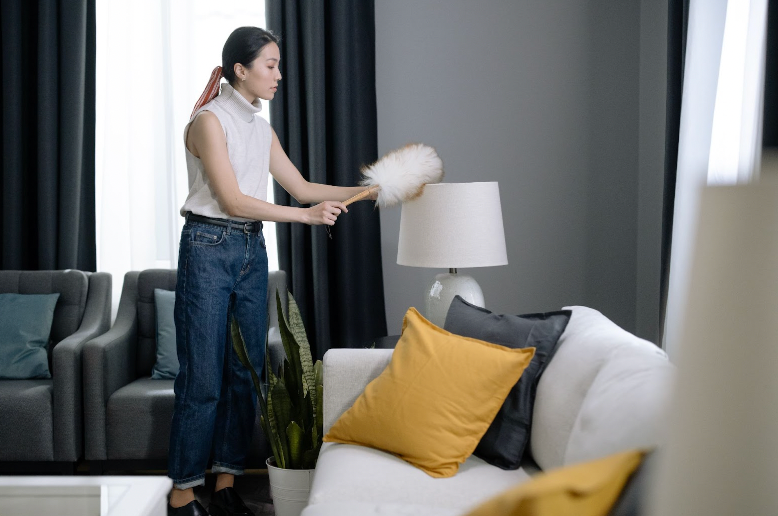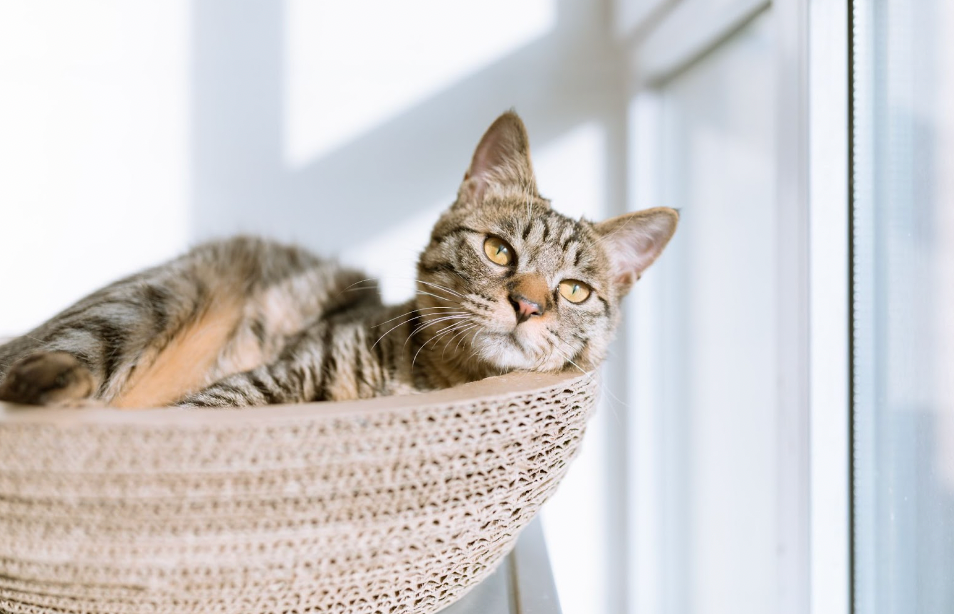Your pet is your baby, your loved one, your family member — but they sure shed a lot! A good air filter for your HVAC system is essential if you live with cats or dogs.
According to the President and Chief Executive Officer of the Asthma and Allergy Foundation of America (AAFA), we spend about 90% of our time indoors. Many people don't know that the air inside your home can be more polluted than the outside. For this reason, having an efficient air filter (or several) for your various systems is crucial.
Not only will a good air filter help remove pet hair, pet dander, and dust from the air, but it will also eliminate other allergens and pollutants that can aggravate your allergies or cause respiratory issues. The right air filter can also help destroy any odors lingering in your home due to your fuzzy but admittedly smelly friends. A good air filter can also prolong the life of your HVAC system, especially if you're changing it regularly.
If you have pets in your home, investing in an exceptionally efficient air filter is a no-brainer. With the right air filter, you can rest assured that the indoor air you and your furry family members breathe is clean and healthy.
What are the Causes of Dust And Pet Hair in Your Home?
There are a few primary causes of dust and pet hair accumulating in your home — and no, it's not just because of your furry friends! Let's go over some of the most common reasons you might find dust, pet hair, and pet dander building up around your house or apartment.

Lack of Proper Cleaning
Lack of proper cleaning can undoubtedly contribute to dust and pet hair buildup in your home. When you neglect to clean your home regularly, dust and pet hair can accumulate on various surfaces, corners, and hard-to-reach places. This can cause dust and pet hair in the air to settle and become more deeply ingrained in your carpets and the upholstery on your furniture.
Another problem with not cleaning your home regularly is that it allows dust and pet hair to accumulate on surfaces like baseboards, window sills, and other areas where these pollutants can easily get disturbed and become airborne particles. This can cause pet hair, dander, and dust to circulate throughout your home, making the issue even more challenging to control.
Poor Ventilation
When your home has poor ventilation, the air inside can become stagnant and stale. This can cause pet hair and dust particles to build up on various surfaces in your home.
Poor ventilation can also lead to pollutants and allergens getting trapped inside, which is likely to end up causing allergic reactions and other respiratory issues. A lack of fresh air causes certain pollutants to become concentrated, making it more difficult for them to be removed from the air.
Pets
Cats and dogs are cute, but they're also likely to track hair over your house. Pets naturally shed hair and dander, which can quickly become airborne and settle on surfaces. It's also worth mentioning that pets can track in dirt and other contaminants from outside.
By taking the time to groom your pets regularly, you can help to reduce the amount of pet hair and dander that builds up in your home. For example, if your dog goes outside to play for a while, he can bring dirt, pollen, and other pollutants on his fur, spreading throughout your home. If you have a cat, they are likely to spend a lot of time scratching or rubbing against your furniture, causing their hair and dander to get embedded in the fabric.

Outdoor Pollution
The air outside is polluted with dust, pollen, and other harmful particles. Unfortunately, it can find its way into your home through the open doors and windows and invade your HVAC system. Once inside, these pollutants can settle into your furniture and build up on your window sills, which may cause allergic reactions in your loved ones.
Cleaning and maintaining your home can be more challenging when you or your family members have allergies or other respiratory problems. This is because allergy symptoms can be exacerbated by exposure to dust, pollen, and other pollutants.
How Dust and Pet Hair Can Affect Your Indoor Air Quality
Indoor air quality is crucial, so it's critical to understand how dust and pet hair in your home can affect it. Let's go over some common quality-of-life issues you might run into if you have a nasty buildup of dust and pet hair in your house or apartment.

Allergic Reactions
Dust and pet hair are common allergens. Long-term exposure can cause symptoms like sneezing, runny nose, itchy eyes, and even asthma attacks in those particularly susceptible. When dust and pet hair accumulates in your home, they can become deeply ingrained in your carpets and upholstery. This can cause these allergens to remain in the air for extended periods, increasing the probability of you or your loved ones experiencing an allergic reaction. Additionally, dust mites thrive in homes where dust and pet hair are present and can contribute to allergy and asthma symptoms.
Respiratory Problems
Dust and pet dander can cause your eyes, nose, and throat to become irritated; it can also aggravate asthma or any other pre-existing respiratory conditions you might be dealing with. When inhaled, these particles can cause your airways to become inflamed, leading to symptoms like shortness of breath, coughing, and wheezing. Furthermore, pets can end up causing respiratory issues, as pet saliva and urine contain proteins that can cause negative respiratory symptoms in some individuals.
Spread of Bacteria and Viruses
Pets can carry various types of bacteria and viruses on their fur, which can quickly spread through your home. If your cat licks its fur and then licks your hand, it might inadvertently make you sick, which is why frequent hand washing is so important when you have pets. Pets have also been known to track dirt, pesticides, and other pollutants from outside, likely to contain bacteria and viruses.
What to Consider When Buying an Air Filter
When it comes to purchasing an air filter that will best suit your needs as a pet owner, there are several factors you're going to want to take into consideration:

Size
The size of an air filter refers to its dimensions, precisely the length, width, and height. Choosing the right size air filter for your home and HVAC system is essential to ensure it will effectively remove dust, pet hair, and other irritating pollutants from the air.
Filter Type
The most common air filters you'll see on the market are fiberglass. While disposable and affordable, fiberglass air filters are designed to protect your HVAC system rather than filter your air. To effectively filter your air you’ll want to look into Nanofiber filters, but more on these later.
Odor Removal
You should also consider odor removal when buying an air filter for pet hair and dust. Your furry friends can leave unpleasant smells in your home due to their urine, feces, and natural scent. These odors can linger long after your pet's mess has been cleaned up, which can be embarrassing if you're expecting to host guests in your home anytime soon.
Thankfully, nanofiber filters can block particles smaller than a micron including odor-causing bacteria, so if your pet has odor issues, consider purchasing this filter for your HVAC system.

What are the Best Air Filters for Dust And Pet Hair?
Below you will find some of the best air filters for getting rid of dust and pet hair accumulated in your home. The air filter you choose will depend on your individual needs as well as how many pets you have.
While many will point you to HEPA filters, activated carbon filters, and electrostatic filters, when it comes to filtering the air of your home, these aren’t the best filters. Yes, they’ll filter the particles from your air better than a fiberglass or pleated filter in your HVAC system, but if you want the best, you need to use Nanofiber filters.
Nanofiber Filters
If you want to breathe your best in your home then choose nanofiber filters for your HVAC system. Nanofiber filters are a unique combination of a nanofiber fabric with a fibrous filtration matrix underneath. It isn’t only about the filtration either, it’s about filtering out the pollutants and VOCs without compromising the airflow through your HVAC system.
Most nanofiber filters are rated at MERV (minimum efficiency reporting value) 13 to 16 meaning that these filters maintain cleaner air while maintaining the efficiency of your HVAC system. A MERV rating of 13 to 16 is what’s recommended for hospitals, labs, and other buildings that require surgical-grade clean air.
Nanofiber filters are capable of trapping particles as small as 0.1 microns and are incredibly effiecient at clearing (95%) of particles of 0.3 microns or larger. That means they can trap viruses, bacteria, and even most smoke particles.
Frequently Asked Questions
What can I do about my pet allergies?
If you have allergies to cats or dogs, using an air filter is one solution that can help reduce your symptoms significantly. Using a high-efficiency air filter, such as a Nanofiber filter, can be especially helpful if you're replacing it regularly and nanofiber filters don’t have to be replaced as often as your average filter. You can also help reduce your allergy symptoms by grooming your pets regularly, keeping your home clean, and keeping your pets out of certain rooms.
What are the best air filters?
When looking for an air filter that effectively removes pet hair and dust from your home, nanofiber filters are your best option. This is because nanofiber filters are capable of capturing particles as small as 0.1 micron.
When it comes to pet dander, the particles average between 5 – 10 microns. About a quarter of pet dander particles are smaller than 2.5 microns. While an average filter may be able to stop the pet dander, your household dust can be much smaller. Dust particles can range in size from 0.5 to 100 microns in size. A nanofiber filter is capable of handling both your household dust, pet dander, and pet hair with ease.
Do air filters remove airborne particles?
Certainly! However, the type of air filter you have implemented in your HVAC system will determine how well it can remove specific harmful particles from the air.
What is the cost of air filter replacement?
The cost of air filter replacement can vary depending on several different factors. A standard fiberglass filter, the most basic and least expensive type of air filter, can cost as little as $1 or $2 each. On the other hand, you can get nanofiber filters for your HVAC from Airzey for $15.
Improve Your Indoor Air Quality With Airzey!
As we've learned, when it comes to removing dust and pet hair from the air in your home, Nanofiber filters are the best option. Implementing a Nanofiber filter in your home's HVAC system will ensure that you and your family members have clean air to breathe, even if you live with pets.
Are you interested in learning more and want to purchase a Nanofiber air filter of your very own? Check out Airzey's selection today!





